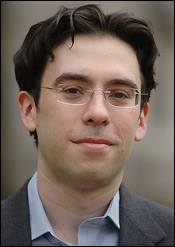Fuse News: A Critic’s Responsibility?
By Jonathan Blumhofer
“A critic’s responsibilities, it seems to us, is to report on, describe in objective terms, and educate the music caring/loving public on the outcome of performances with critical but responsible commentary.”
That’s all? Since when, exactly?
The above comes from a response by a writer called “Levchen” to Jeremy Eichler’s recent piece in the Boston Globe discussing the Boston Symphony’s search for a new music director, in this case an essay on the merits and demerits of Daniele Gatti, one of the BSO’s regular guest conductors this season. Now Eichler is a fine critic and a writer I personally hold in high regard, though he and I have certainly differed in our responses to various concerts we have both reviewed. And it so happens in this instance that I am in overall agreement with his conclusions, but that’s beside the point.
Of late there’s been a discussion in the pages of the Fuse about the general blandness of arts coverage in Boston. Some reasons have already been suggested, but let me add another to the list: blandness is what’s expected. What other conclusion is there to draw from the suggestion that a critic is supposed to be nothing more than a weatherman (or woman) reporting on how much artistic rain or shine fell in Symphony Hall last night?
If such a shallow summation of the critic’s role is to be tolerated, why bother writing criticism at all? Thank goodness Robert Schumann, Eduard Hanslick, Hector Berlioz, Bernard Shaw, and Philip Hale (and Alan Rich, Virgil Thomson, and Harold Schonberg, to cite just three more recent examples) kept their subjective responses to the music they heard and any other supplemental thoughts that crossed their cerebellums under wraps. Oh wait—they didn’t. Those writers were, in their days, among the most influential voices on music and remain, for all the controversy they elicited and wild misjudgments they pronounced (like Hanslick’s famous verdict that Tchaikovsky’s Violin Concerto demonstrated that there is “music that stinks to the ear”), among the most consequential thinkers and shapers of musical-aesthetic values in the last two centuries. One might reasonably argue that that’s the end criticism ought to aspire towards, but then that would require holding that the arts serve to do more than merely entertain (though entertain they certainly can).
Of course, the nineteenth-century writers were individuals who believed this, and they generally wrote for an audience interested in greater aesthetic implications than just how well so-and-so performed a 200-year-old piano concerto on Saturday night at the Gewandhaus. To expect holders of Levchen’s viewpoint (and, rest assured, there are plenty of them out there) to embrace a similar artistic worldview would necessitate exploding the museum culture that encases many of the arts, especially classical music. Think of it: classical music as functional music, a living, breathing, expressive art that confronts the nitty-gritty of human experience and does more than just serve as an easy chair for the ears or the backdrop to dinner parties. In other words, something worth opining about because, well, it’s important and relevant—what a concept!
Generally in New England we’re outspoken about nearly everything—politics, social issues, sports—so why not the arts? In music, that would mean that there’s some greater value to the art form than just the concert experience, but, then again, just about any composer, musician, or serious music lover would tell you that there is. And they’d be right.
As for Eichler’s article, it touches on any number of subjects that one assumes must be under consideration by the BSO’s administration and search committee as they look for a new director. It’s a thorough, well-written discussion that takes no cheap shots and is something one should expect from the classical critic of the flagship Boston newspaper. But the Levchenites aren’t happy. The comment ends with the observation that “Mr. Eichler, here, has pushed his own personal agenda at the expense of these premiums [objectivity, concert-reporting, etc.], and beyond what we regard as proper and appropriate.” Has he? Good—that’s his job.
Jonathan Blumhofer is a composer and violist who has been active in the greater Boston area since 2004. His music has received numerous awards and been performed by various ensembles, including the American Composers Orchestra, Kiev Philharmonic, Camerata Chicago, Xanthos Ensemble, and Juventas New Music Group. Since receiving his doctorate from Boston University in 2010, Jon has taught at Clark University, Worcester Polytechnic Institute, and online for the University of Phoenix, in addition to writing music criticism for the Worcester Telegram & Gazette.

